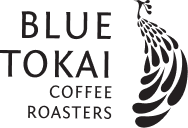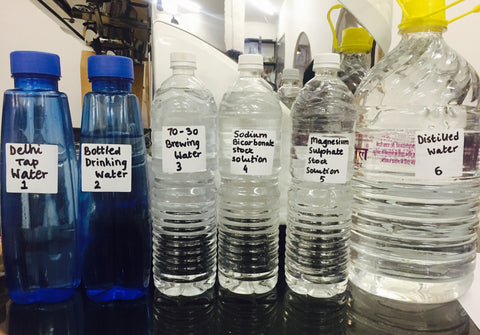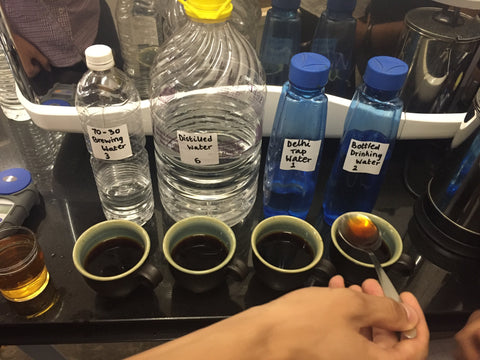Following up on our earlier blog post on water and coffee, we did an experiment to gauge how much your water affects the flavor of the final brew. We brewed the same coffee using the same recipe and equipment but only varied the type of water used. We used four different types of water to see how the taste changed due to the difference in the chemical composition of each sample of water.
Taking into consideration the key role that dissolved minerals play in the brewing process, we decided to take our coffee geekery to the next level by creating a special brewing water. Using the recipe developed by Five Senses Coffee, we created two solutions using Epsom salt and baking soda and added these to distilled water. We then used these solutions to concoct a special 70-30 brewing water which is based on specific concentrations of bicarbonate and magnesium in the finished water. This 70-30 brewing water is supposed to have an optimum amount of dissolved minerals which extract the right amount of flavor from the coffee. Considering most people wouldn't want to go through the effort of creating special water for brewing, we wanted to see how it compared to standard bottled water (we used Kingfisher). We also brewed the coffee using distilled water to see what the complete absence of minerals does. At the opposite end of the spectrum, we used Delhi tap water since we figured that the water, flush with the dregs of the Yamuna, would definitely impart a unique taste to our final brew.
First, we measured the TDS (Total Dissolved Solids include components such as Calcium, Magnesium Carbonate, Fluoride, Iron and Sulfates) using a VST refractometer. The results were:
- Tap Water - 1000ppm
- Drinking Water - 500ppm
- 70-30 Brewing Water - 120ppm
- Distilled Water - 0 ppm
Unsurprisingly, Delhi tap water had the highest TDS while distilled water had none.
After preparing the different water samples, we used the Pour Over method to brew our coffee to see how the TDS affected the flavor of each. We only used tap water, drinking water, 70-30 brewing water and distilled water in the experiment. Our brewing recipe was 16 g of water for every gram of coffee and the total brew time was 2 minutes and 30 seconds.
This is what we tasted in each sample -
- 70-30 Brewing Water - sparkling acidity, neither fruity nor bitter with a clean finish
- Distilled Water - bitter, acrid, sour, flat
- Delhi Tap Water - bitter, dull finish, muddy, flat
- Bottled Drinking Water - fruitier than the 70-30 brewing water, big body, smooth finish
We had a split panel in terms of which water was preferred. Two of the tasters liked the pronounced acidity of the 70-30 water while the the remaining three preferred the balance of the bottled water. Not suprisingly, the Delhi tap water coffee had off flavors due to the excessive amount of “stuff” dissolved in it with a notable absence of acidity. Distilled water lacked any minerals to interact with the coffee and the taste was flat, and yet both sour and bitter.








